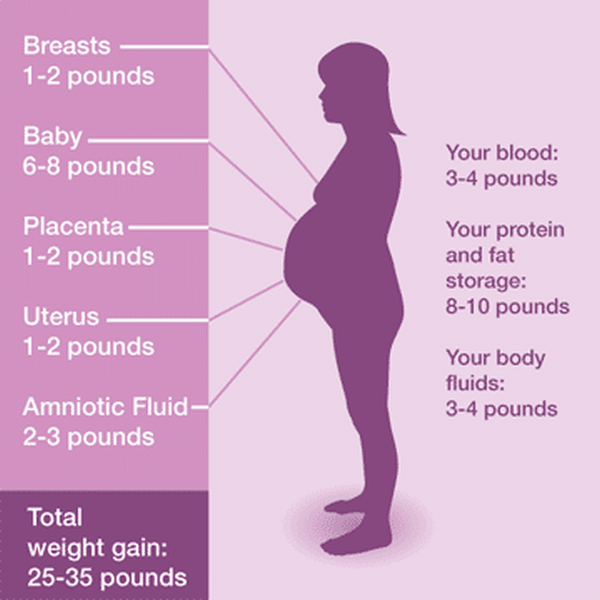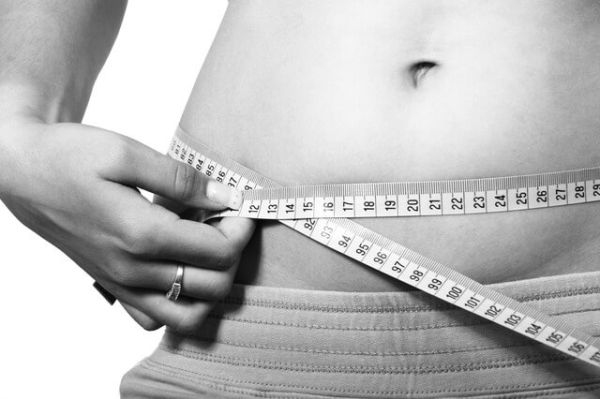Your hormones are all over the place, you’re fatigued, and you’ve got a second body to grow.
And you’re gaining weight. Fast.
Is that good? Bad? Should you be gaining more or less?
Well, if you’re struggling with weight gain during your pregnancy, or if you want to avoid the struggle, you need to read this article.
We’ll be covering how to use diet and exercise to keep weight gain during your pregnancy to a healthy minimum, which makes for an all-around better experience for both you and your baby.
Let’s get started.
Table of Contents
+
How Much Weight Should You Gain During Pregnancy?

Research shows that nearly half of all pregnant women gain too much weight during pregnancy.
This increases the risk of a host of health problems for them and their babies, including…
- Urinary tract infections
- Postpartum infection
- Overdue delivery
- Miscarriage
- Gestational diabetes
- C-section complications
What is “too much weight,” though?
Well, here’s how to the Institute of Medicine breaks down healthy weight gain during pregnancy:

(Underweight women are recommended to gain a bit more and overweight a bit less. Ideally, you’d start your pregnancy lean and fit [around 20% body fat].)
Now, if you’re only supposed to gain 25 to 35 pounds over the course of 9 months, that means it needs to be a very gradual increase.
In fact, according to the IoM research, weight gain during the first trimester (0 to 13 weeks) should be very minimal–about 1 to 1.5 pounds.
Then, from week 14 on, it should look like this:
| BMI Weight Group | BMI | Recommended Total Weight Gain | Recommended Weight Gain Per Week |
| Underweight | Under 18.5 | 28 – 40 lbs | 1 – 1.3 lbs |
| Normal | 18.5 – 25 | 25 – 35 lbs | 1 lbs |
| Overweight | 25 – 30 | 15 – 25 lbs | 0.6 lbs |
| Obese | Over 30 | 11 – 20 lbs | 0.5 lbs |
So if that’s the target, how you get there? And more importantly, how do you prevent near catastrophic levels of gestational weight gain?
Well, it starts with how many calories you eat every day.
How to Use Diet to Reduce Weight Gain During Pregnancy

Your body has to build another body, so it’s logical to assume that it will need more food.
That said, what most people like to call “eating for two” is more like “eating for twenty.”
This, plus little to no physical activity, is why so many women gain so much fat during pregnancy.
Now, when pregnant, you’re going to want to base your food intake on your total daily energy expenditure (TDEE).
This is the total amount of energy you’re burning every day through your metabolism, the food you eat, and physical activity.
If you don’t know how to calculate your TDEE, check out this article.
Once you know your TDEE, you’re able to understand the standard medical recommendations on how many calories you should be eating every day throughout your pregnancy:
- 1st Trimester (0 – 13 weeks): TDEE with no additional calories.
- 2nd Trimester (14 – 28 weeks): Increase TDEE by 340 calories.
- 3rd Trimester (28 to 40/42 weeks): Increase TDEE by 450 calories.
(These numbers are for women starting in a normal body weight range and are modified up or down if starting under- or overweight.)
Many women are surprised by those recommendations.
No additional calories for the first 13 weeks!? And then just an additional 340 to 450 calories per day until the baby is born??
To put that in perspective, an apple with a cup of yogurt and a few almonds is about 400 calories.
So yes, that means no going back for seconds and thirds every night, no snacking on chocolate bars, and no sending the husband out at 2 AM to get milkshakes.
Pregnancy shouldn’t be viewed as a license to eat anything.
In fact, it’s a terrible excuse to be gluttonous because gaining too much fat during pregnancy isn’t just impairing your health, it’s risking your baby’s as well.
That said, there’s no question that controlling caloric intake while pregnant can be challenging.
It’s not impossible, though.
First, you need to understand why it’s worth the trouble.
Controlling your food intake and thus weight gain is healthier for you and your baby.
It also makes it much easier to get your weight back to where you want it after delivering the baby.
People love to find or make excuses to overeat, and pregnancy is certainly a compelling one, but trust me–if you chronically overeat during your pregnancy, you will regret it.
Even if you avoid complications during the pregnancy and delivery, you’ll be faced with the harsh reality of 6+ months of dieting to get back to a normal body weight on top of little sleep and having to care for the new addition to your family.
This is why research shows that excessive weight gain during pregnancy is a significant predictor of post-partum weight retention.
The bottom line is if you gain too much fat while you’re pregnant, getting back to normal is an uphill battle.
Second, don’t assume you’re going to turn into a ravenous garbage disposal.
Many women struggle with hunger while pregnant but many others don’t.
Assume you won’t and you may be pleasantly surprised.
(The same goes for breastfeeding–it increases hunger in some women and doesn’t in others.)
Third, the women I know that have been most successful with controlling food intake while pregnant created and followed meal plans.
This helps prevent both the bingeing and passive overeating that plague (and fatten) so many pregnant women.
So, that’s caloric intake while pregnant. Let’s now talk specific foods.
The Best Foods to Eat While Pregnant

Generally speaking, the “best” foods to eat while pregnant are those that are nutritious, filling, and relatively low in calories.
By filling your diet with these types of foods, you can stave off hunger while controlling your caloric intake and ensure your body gets the micronutrients it needs for a safe, healthy pregnancy.
Here’s a simple list of these foods:
- Lean meats like chicken, turkey, lean cuts of red meat, etc.
- Oily fish that are low in mercury (for omega-3 fatty acids) like Wild Alaskan salmon, char, Atlantic mackerel, sardines, etc.
- Low-fat dairy products like 2% milk and Greek yogurt, low-fat cheeses like Parmesan and mozzarella, etc.
- Eggs
- Whole grains like wheat, brown rice, oats, and barley.
- Vegetables of all kinds, with a special emphasis on leafy greens.
- Legumes like green peas and beans.
- Tubers like white potato and sweet potato.
As you can see, you have quite a few tasty foods to choose from.
As a general rule, try to get about 80% of your daily calories from foods listed above and you can fill the remaining 20% with “treats.”
This covers all bases:
- It keeps your calories where they need to be.
- It gives your body the nutrients it needs.
- It accommodates your sweet tooth.
I also recommend that you eat a high-protein diet with a moderate amount of carbohydrate and fat.
Specifically, I recommend that you set your macronutrient intake like this:
- 40% of your daily calories from protein
- 30% of your daily calories from carbs
- 30% of your daily calories from fat
(If you’re not sure how “macronturient-based dieting” works, check out this article.)
This balanced approach will give your body everything it needs to build a strong, healthy baby while maintaining it own health.
As we’re talking weight and health during pregnancy, let’s talk water intake.
How Much Water You Should Drink While Pregnant

Drinking enough water is important for everyone, but is particularly important for pregnant women.
Research shows that a good target to shoot for is 1 to 1.5 ml of water for each calorie consumed.
Thus, a woman eating 2,000 calories per day should drink 2,000 to 3,000 ml of water per day (about 1/2 to 3/4 of a gallon).
Drinking enough water does more than support basic health, though–it also helps prevent weight gain by helping you control your caloric intake.
How to Use Exercise to Reduce Weight Gain During Pregnancy

Research shows that just 30 minutes of moderate daily exercise is enough to significantly improve your and your baby’s health while you’re pregnant.
This is why I recommend some form of physical activity every day while pregnant, including 3 to 5 workouts per week, that last 30 to 60 minutes each.
You’ll see the best results from a combination of cardiovascular and resistance training, so let’s take a look at how to structure your workouts when you’re expecting…
Warming Up
Begin with 5 to 7 minutes of warm-up, aiming for no more than a 3 on the RPE Scale, which is a 1 – 10 scale for the difficulty of your training (Rate of Perceived Exertion).
Here are some good exercises for this:
- Treadmill
- Recumbent cycle
- Grapevine
- Toe touch on a step box
- Walk forward & back
As you can see, the emphasis should always be low impact activities with no excessive ranges of motion or hip swinging.
Cardio
After you’ve warmed up, I recommend you do 10 to 20 minutes of moderate-intensity cardiovascular exercise (4 to 6 RPE).
This helps bolster daily energy expenditure and insulin sensitivity, which in turn helps reduce weight gain. Research also shows that it also benefits the fetus’s heart as it develops.
Again, think low-impact activities with moderate ranges of motion and no jerking or swinging.
Resistance Training
Once you’ve done your cardio, you should do about 30 minutes of resistance training.
This does more than burn energy as well–it helps maintain muscle mass, which is vital for preserving both your physique and general health.
If you’re new to resistance training, I recommend that you start with a full-body routine that you do several times per week.
Here’s an example of one that will work well:
Rest 1 to 2 minutes in between each set.
2 sets of 10 to 12 reps
2 sets of 10 to 12 reps
2 sets of 10 to 12 reps
2 sets of 10 to 12 reps
2 sets of 10 to 12 reps
2 sets of 20 reps (bodyweight)
In terms of progression, you should add weight to the exercise once you can do 12 reps with good form.
This way you will get stronger over time, which is the primary goal of all resistance training.
And if you’re an experienced weightlifter used to giving everything you’ve got to your weightlifting, I recommend you dial the intensity back a bit while pregnant.
There’s nothing wrong with challenging yourself in your workouts but all-out, max-effort training while pregnant increases the risk of injury to you and your baby and just isn’t worth it.
Also, it’s worth noting that as you move through your second trimester and enter your third, you’ll want to do as many seated movements as possible, minimizing up and down movements.
Relaxation Exercises

Research shows that reducing stress during pregnancy can help to reduce the likelihood of a miscarriage, particularly early on.
This is why I recommend you do 10 to 15 minutes of relaxation exercises several times per week. You can do them after your cardio and resistance training workouts or do them separately.
Here are the two types of exercises I recommend:
Active Progressive Relaxation
This method of relaxation is simple: you tense and relax each major muscle group in your body, paying close attention to the difference between tensed and relaxed muscles.
Here’s how to do it:
- Lie on a comfortable surface (or sit, as preferred) and gradually tense all the muscles in your legs until they are fully contracted, and hold this tension for 5 to 10 seconds.
- Then, let all the tension go, feeling your muscles go limp, loose, and relaxed. Hold this state of relaxation for 20 to 30 seconds.
- Next, do the same with your arms, shoulders, and hands, contracting and then relaxing them as a group.
- Move to your back next, tightening the muscles so they pull your shoulders back.
- Contract and relax the muscles in your chest and core next, and finish with the muscles in your face.
Do three full rounds of these contractions and relaxations before moving on to the Benson Method.
The Benson Method
The Benson Method is perfect for beginners to relaxation practices. It teaches you to calm the body through controlled and relaxed breathing.
Here’s how to do it:
- Get comfortable and close your eyes.
- Choose a relaxing word of phrase for the exercise.
- Breathe in and out in a slow, steady rhythm, repeating the word or phrase softly with each breath.
After several minutes, you should feel noticeably more relaxed.
The Bottom Line on Weight Gain During Pregnancy

You now have all the tools you need to manage your weight gain while pregnant and avoid the pitfalls that many women fall into.
Monitor your caloric intake, keep your macronutrients balanced, and exercise regularly, and you’ll not only gain the minimal (healthy) amount of weight while pregnant, but, more importantly, you’ll give birth to a happy, healthy child.










